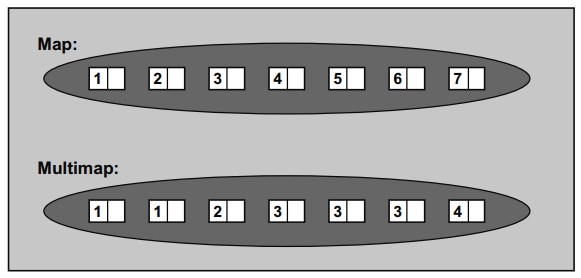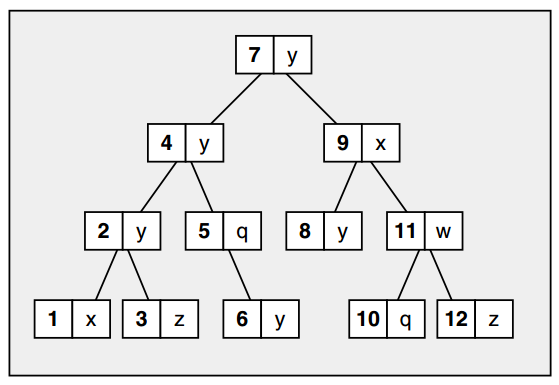包含头文件<map>。
1 2 3 4 5 6 7 8 9 10 namespace std { template < typename Key, typename T, typename Compare = less<Key>, typename Allocator = allocator<pair<const Key,T> > > class map ; template < typename Key, typename T, typename Compare = less<Key>, typename Allocator = allocator<pair<const Key,T> > > class multimap ; }
map容器的key和value必须是copyable且movable的。而且key必须可用排序标准进行比较。
Operation
Effect
map c
Default constructor; creates an empty map/multimap without any elements
map c(op)
Creates an empty map/multimap that uses op as the sorting criterion
map c(c2)
Copy constructor; creates a copy of another map/multimap of the same type (all elements are copied)
map c = c2
Copy constructor; creates a copy of another map/multimap of the same type (all elements are copied)
map c(rv)
Move constructor; creates a new map/multimap of the same type, taking the contents of the rvalue rv (since C++11)
map c = rv
Move constructor; creates a new map/multimap of the same type, taking the contents of the rvalue rv (since C++11)
map c(beg, end)
Creates a map/multimap initialized by the elements of the range [beg,end)
map c(beg, end, op)
Creates a map/multimap with the sorting criterion op initialized by the elements of the range [beg,end)
map c(initlist)
Creates a map/multimap initialized with the elements of initializer list initlist (since C++11)
map c = initlist
Creates a map/multimap initialized with the elements of initializer list initlist (since C++11)
c.~map()
Destroys all elements and frees the memory
其中,map可以是:
map
Effect
map<Key, Val>A map that by default sorts keys with less<> (operator <)
map<Key, Val, Op>A map that by default sorts keys with Op
multimap<Key, Val>A multimap that by default sorts keys with less<> (operator <)
multimap<Key, Val, Op>A multimap that by default sorts keys with Op
Operation
Effect
c.key_comp()
Returns the comparison criterion
c.value_comp()
Returns the comparison criterion for values as a whole (an object that compares the key in a key/value pair)
c.empty()
Returns whether the container is empty (equivalent to size()==0 but might be faster)
c.size()
Returns the current number of elements
c.max_size()
Returns the maximum number of elements possible
c1 == c2
Returns whether c1 is equal to c2 (calls == for the elements)
c1 != c2
Returns whether c1 is not equal to c2 (equivalent to !(c1==c2) )
c1 < c2
Returns whether c1 is less than c2
c1 > c2
Returns whether c1 is greater than c2 (equivalent to c2<c1)
c1 <= c2
Returns whether c1 is less than or equal to c2 (equivalent to !(c2<c1) )
c1 >= c2
Returns whether c1 is greater than or equal to c2 (equivalent to !(c1<c2) )
比较只发生在相同类型之间,即key/value/sorting criterion都必须相同。
Operation
Effect
c.count(val)
Returns the number of elements with key val
c.find(val)
Returns the position of the first element with key val (or end() if none found)
c.lower_bound(val)
Returns the first position where an element with key val would get inserted (the first element with a key >= val)
c.upper_bound(val)
Returns the last position where an element with key val would get inserted (the first element with a key > val)
c.equal_range(val)
Returns a range with all elements with a key equal to val (i.e., the first and last positions, where an element with key val would get inserted)
用来查找key,而不是value。查找value要用标准库的find_if()(这个还需要一个把元素和某个值比较的函数物体),或手动写一个循环。在循环里remove元素要小心迭代器失效。用find_if
1 2 3 4 auto posVal = find_if( coll.begin(),coll.end(), [] (const pair<float ,float >& elem) { return elem.second == 3.0 ; });
Operation
Effect
c = c2
Assigns all elements of c2 to c
c = rv
Move assigns all elements of the rvalue rv to c (since C++11)
c = initlist
Assigns all elements of the initializer list initlist to c (since C++11)
c1.swap(c2)
Swaps the data of c1 and c2
swap(c1, c2)
Swaps the data of c1 and c2
Operation
Effect
c.begin()
Returns a bidirectional iterator for the first element
c.end()
Returns a bidirectional iterator for the position after the last element
c.cbegin()
Returns a constant bidirectional iterator for the first element (since C++11)
c.cend()
Returns a constant bidirectional iterator for the position after the last element (since C++11)
c.rbegin()
Returns a reverse iterator for the first element of a reverse iteration
c.rend()
Returns a reverse iterator for the position after the last element of a reverse iteration
c.crbegin()
Returns a constant reverse iterator for the first element of a reverse iteration (since C++11)
c.crend()
Returns a constant reverse iterator for the position after the last element of a reverse iteration (since C++11)
双向迭代器。要想修改里面的元素,必须用这个容器自己提供的成员函数。因为key是const的,不能用标准库里的做修改的任何通用函数。一个修改value的例子:
1 2 3 4 5 6 7 8 9 10 std ::map <std ::string ,float > coll;std ::for_each ( coll.begin(), coll.end(), [] (std ::pair<const std ::string ,float >& elem) { elem.second += 10 ; });
Operation
Effect
c.insert(val)
Inserts a copy of val and returns the position of the new element and, for maps, whether it succeeded
c.insert(pos, val)
Inserts a copy of val and returns the position of the new element (pos is used as a hint pointing to where the insert should start the search)
c.insert(beg, end)
Inserts a copy of all elements of the range [beg,end) (returns nothing)
c.insert(initlist)
Inserts a copy of all elements in the initializer list initlist (returns nothing; since C++11)
c.emplace(args…)
Inserts a copy of an element initialized with args and returns the position of the new element and, for maps, whether it succeeded (since C++11)
c.emplace_hint(pos, args…)
Inserts a copy of an element initialized with args and returns the position of the new element (pos is used as a hint pointing to where the insert should start the search)
c.erase(val)
Removes all elements equal to val and returns the number of removed elements
c.erase(pos)
Removes the element at iterator position pos and returns the following position (returned nothing before C++11)
c.erase(beg, end)
Removes all elements of the range [beg,end) and returns the following position (returned nothing before C++11)
c.clear()
Removes all elements (empties the container)
C++11后删除同一value所有元素的例子:
1 2 3 4 5 6 7 8 9 std ::map <std ::string ,float > coll;for (auto pos = coll.begin(); pos != coll.end(); ) { if (pos->second == value) { pos = coll.erase(pos); } else { ++pos; } }
C++11前删除同一value所有元素的例子:
1 2 3 4 5 6 7 8 9 10 11 12 typedef std ::map <std ::string ,float > StringFloatMap;StringFloatMap coll; StringFloatMap::iterator pos; for (pos = coll.begin(); pos != coll.end(); ) { if (pos->second == value) { coll.erase(pos++); } else { ++pos; } }
Operation
Effect
c[key]
Inserts an element with key, if it does not yet exist, and returns a reference to the value of the element with key (only for nonconstant maps)
c.at (key)Returns a reference to the value of the element with key (since C++11)
1 2 3 4 5 6 7 8 9 10 11 12 13 14 15 16 17 18 19 20 21 22 23 #include <map> #include <string> #include <iostream> #include <algorithm> using namespace std ;int main () map <string , double > coll; coll.insert(make_pair("tim" , 9.9 )); coll.insert(make_pair("struppi" , 11.77 )); for_each(coll.begin(), coll.end(), [] (pair<const string , double >& elem) { elem.second *= elem.second; }); for_each(coll.begin(), coll.end(), [] (const map <string , double >::value_type& elem) { cout << elem.first << ": " << elem.second << endl ; }); system("Pause" ); }
1 2 3 4 5 6 7 8 9 10 11 12 13 14 15 16 17 18 19 20 21 22 23 24 25 26 27 28 29 30 31 32 33 34 35 36 37 38 39 40 41 42 43 44 45 46 47 48 49 50 51 52 #include <map> #include <string> #include <iostream> #include <iomanip> using namespace std ;int main () typedef map <string , float > StringFloatMap; StringFloatMap stocks; stocks["BASF" ] = 369.50 ; stocks["VW" ] = 413.50 ; stocks["Daimler" ] = 819.00 ; stocks["BMW" ] = 834.00 ; stocks["Siemems" ] = 842.20 ; StringFloatMap::iterator pos; cout << left; for (pos = stocks.begin(); pos != stocks.end(); ++pos) { cout << "stock: " << setw(12 ) << pos->first << "price: " << pos->second << endl ; } cout << endl ; for (pos = stocks.begin(); pos != stocks.end(); ++pos) { pos->second *= 2 ; } for (pos = stocks.begin(); pos != stocks.end(); ++pos) { cout << "stock: " << setw(12 ) << pos->first << "price: " << pos->second << endl ; } cout << endl ; stocks["Volkswagen" ] = stocks["VW" ]; stocks.erase("VW" ); for (pos = stocks.begin(); pos != stocks.end(); ++pos) { cout << "stock: " << setw(12 ) << pos->first << "price: " << pos->second << endl ; } cout << endl ; system("Pause" ); }
1 2 3 4 5 6 7 8 9 10 11 12 13 14 15 16 17 18 19 20 21 22 23 24 25 26 27 28 29 30 31 32 33 34 35 36 37 38 39 40 41 42 43 44 45 46 47 48 49 50 51 52 53 54 55 56 57 58 59 60 61 62 63 64 65 66 67 68 69 70 71 72 73 74 75 76 77 78 79 #include <map> #include <string> #include <iostream> #include <iomanip> #include <algorithm> #include <cctype> using namespace std ;class RuntimeStringCmp{ public : enum cmp_mode {normal, nocase}; private : const cmp_mode mode; static bool nocase_compare (char c1, char c2) { return toupper (c1) < toupper (c2); } public : RuntimeStringCmp (cmp_mode m = normal) : mode(m) {} bool operator () (const string & s1, const string & s2) const { if (mode == normal) {return s1 < s2;} else { return lexicographical_compare(s1.begin(), s1.end(), s2.begin(), s2.end(), nocase_compare); } } }; typedef map <string ,string ,RuntimeStringCmp> StringStringMap;void fillAndPrint (StringStringMap& coll) int main () StringStringMap coll1; fillAndPrint(coll1); RuntimeStringCmp ignorecase (RuntimeStringCmp::nocase) ; StringStringMap coll2 (ignorecase) ; fillAndPrint(coll2); system("Pause" ); } void fillAndPrint (StringStringMap& coll) coll["Deutschland" ] = "Germany" ; coll["deutsch" ] = "German" ; coll["Haken" ] = "snag" ; coll["arbeiten" ] = "work" ; coll["Hund" ] = "dog" ; coll["gehen" ] = "go" ; coll["Unternehmen" ] = "enterprise" ; coll["unternehmen" ] = "undertake" ; coll["gehen" ] = "walk" ; coll["Bestatter" ] = "undertaker" ; cout .setf(ios::left, ios::adjustfield); for (StringStringMap::iterator it = coll.begin(); it != coll.end(); ++it){ const StringStringMap::value_type& elem = *it; cout << setw(15 ) << elem.first << " " << elem.second << endl ; } cout << endl ; }
[1] The C++ Standard Library 2nd Edition

